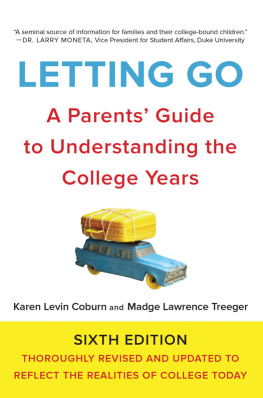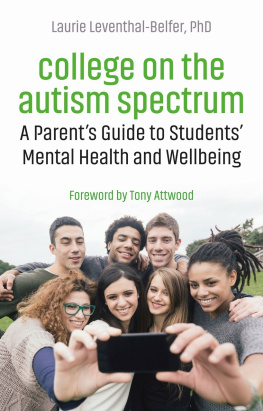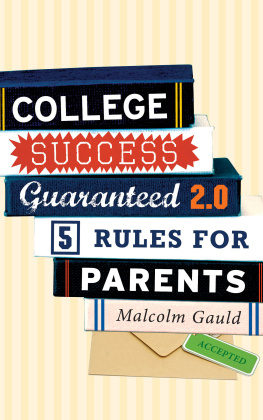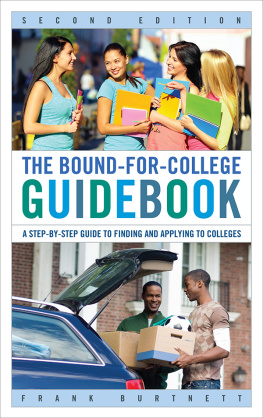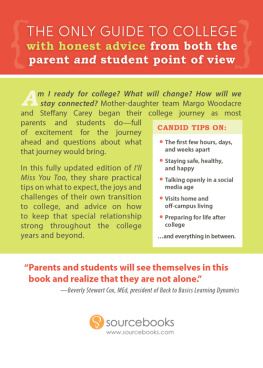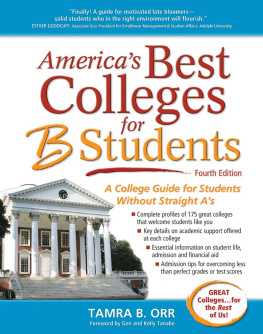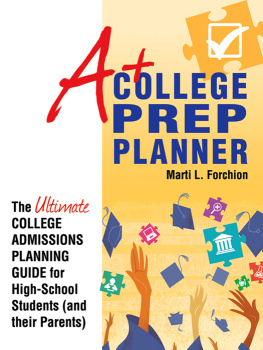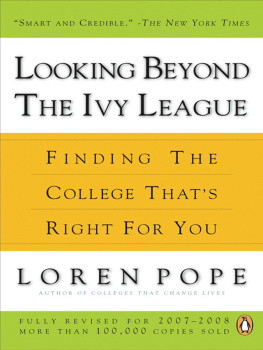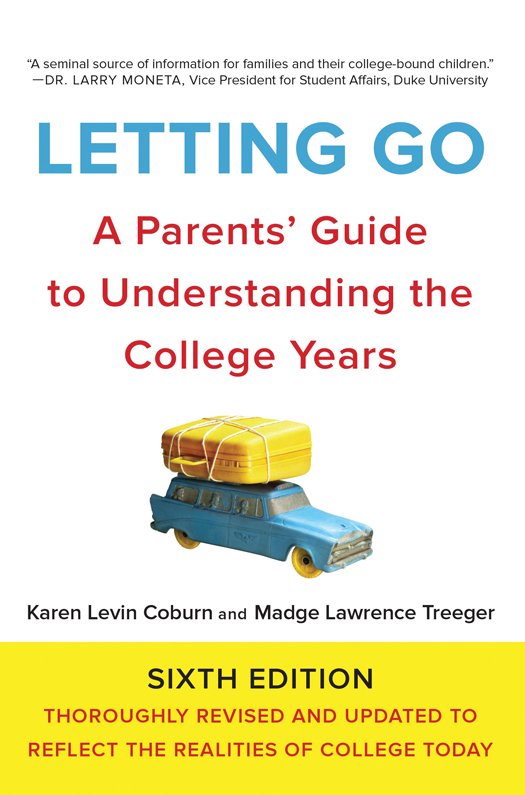
Karen Levin Coburn photograph courtesy of Joe Angeles/WUSTLphotos
RETURNING TO LETTING GO TO WRITE THE SIXTH edition is like opening an old family photo albumfull of nostalgia, with warm memories of all the students and parents who contributed to previous editions as they set off on the college journey. This new edition is filled with the voices of new students, parents, faculty, and administrators who have generously added their experiences and insights to those who have come before them.
My coauthor Madge Treeger and I have had the good fortune of a close and felicitous partnership throughout the five editions that preceded this one. Together we have enjoyed the stimulation of delving into new research about students and the rapid changes in higher education, the liveliness of new interviews and perspectivesthe ever-fascinating transition to college and the years that follow.
Although Madge has moved on from university life to other ventures, her wisdom and insights remain throughout the book. I have taken the lead on this sixth edition, but Letting Go was a joint creation, and will always belong to the two of us.
There are many changes both visible and invisible that affect the climate of the campus and those engaged in life there: demographic changes, economic shifts, and a magnified sense of anxiety in our culture. All have caused profound challenges for students, their families, and the whole academic enterprise. These challenges are apparent in the increasingly frantic and competitive press to get in by students, and the parallel race of the institutions to position themselves on the top of prestigious lists; in the rapidly rising costs and the financial burden on families as their children leave for college at an economically shaky time; in the pressure on the institutions themselves to keep up with technological and global imperatives; in the enormous increases in numbers of students seen at counseling centers; in new security measures and emergency procedures and challenges to privacy.
These realities have influenced todays parents, who are more involved in their childrens lives than generations of the past. Many are justly proud of the fact that their college-age children are closer to them than they had been to their own parents. But how close? How involved? The so-called helicopter parentsparents who hoverhave become the target of the media and many college administrators. How do parents walk this balance beamenjoying the closeness of their relationship with their adolescent children while encouraging them to become increasingly confident and competent during their college years? In our world of instant and ubiquitous communication, how can a parent enjoy sharing the joys and sorrows of a daughter or son, providing support while resisting the urge to solve problems and rescue from afar? This is the daunting task facing todays college parent, and this is the focus of much of our bookfinding the balance, letting go while staying connected.
Twenty-first-century colleges and universities are tackling these challenges as well. Recognizing that students may not need the in loco parentis of yesteryear, but acknowledging that they do need the wisdom of experienced adults available to them as guides, counselors, and mentors, more faculty and staff are involved in the daily lives of students, some even within the residence halls. Many schools are forming a partnership with parents, creating comprehensive parent websites and special parent programs that provide information about the college and its resources for students. The goal is to reduce the impulse to hover and to help parents find appropriate and effective ways to respond so that they can support their childs growing independence.
My office is situated in a building that is a hub of activity for students, faculty, and staff. As I write about diversity, I experience it firsthand. In the studio across the way, the insistent drumming from an African dance class draws my attention; the room is filled with white, black, and Asian young men and women of varying size and ability, clad in colorful sarongs, stomping their feet and leaping through space. On St. Patricks Day, I glance out the window to see a young man striding across campus with collar-length green hair flowing from under his yarmulke. Sounds of the Visions Gospel Choir practicing in the chapel mingle with the polite applause coming from the nearby formal lounge during a lecture on Justice and the Feminization of Global Poverty. On one evening after Ive spent several hours at the computer, the sweet aroma of the Korean Student Associations barbecue is a reminder that its time for dinner.
Each day or night is different, all reverberating to the college scene and reflecting the time of year and the state of the weather. The unrelenting drilling noise from yet another construction site across the lawn competes with the distant cheering from an intramural soccer game. Studentsmen and womencelebrate the first hot day of the year with a full-fledged water fight; they toss water-filled balloons at one another until all collapse, soaking wet, laughing, and exhausted. The Quad is filled with a stage and massive sound equipment as students wrapped in ski jackets on an unseasonably cold evening rehearse the spring musical.
A parent calls seeking advice about a proposed visit to a homesick daughter. A sophomore stops by to get a signature for a summer program in Kenya. A proud senior comes by with a poster advertising his upcoming art exhibit. The chapel bells ring on the quarter houra sonorous reminder of fleeting time.
This is but a glimpse of the captivating world your child is about to enter. There is much in todays college experience that has a distinctly new flavor, and part of the aim of this book is to give you an insiders view. Though the rate of change in many dimensions of college life has accelerated dramatically, much of what we wrote in the original edition of Letting Go remains the same. It is the soul of our bookthe ongoing but changing relationship between parents and their about-to-be-adult children during the college years.
Karen Levin Coburn
St. Louis, 2016
IM NOT GETTING OUT.
I sat behind the wheel of the car; Jennie sat beside me with her tattered stuffed teddy bear at her side, and we looked out at the line of young men and women laughing and chatting as they waited for the doors of the freshman dormitory to open.
Im not getting out, she repeated.
I panicked. My mind flashed back to the first day of nursery school. Dont leave me were her words then.
But you wanted to get here early to get the best bed, I reminded her.
Ive changed my mind, she replied. That was evident.
We had just traveled for seventeen hours, over two days. Jennie was beginning her freshman year at collegeour first child to leave home. Was I going to have to turn around and go back to St. Louis with her still beside me?
Suppose we get out and just stand next to the car. She agreed reluctantly. I was relieved to see her leave the teddy bear in the car.

